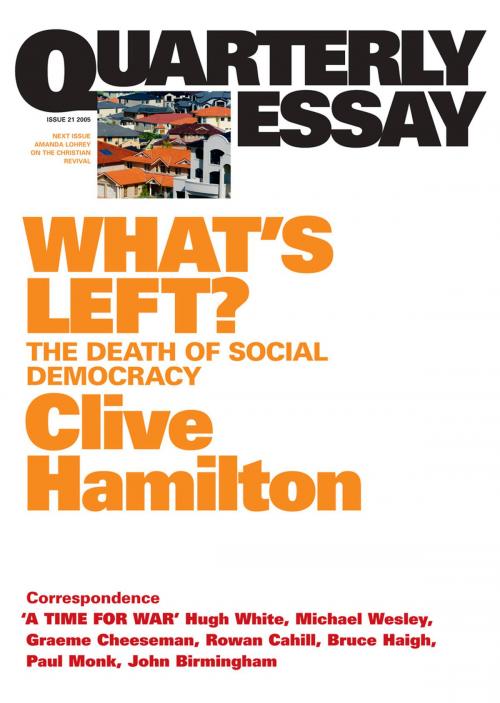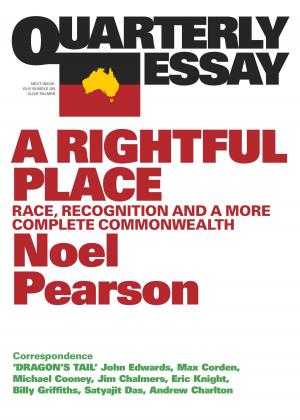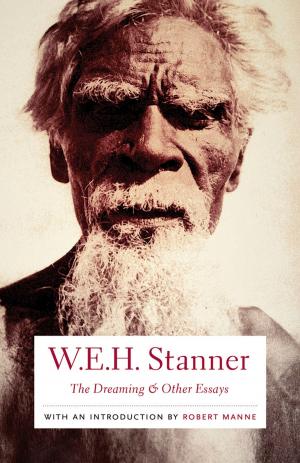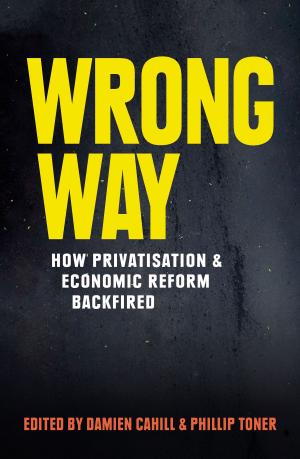Quarterly Essay 21 What's Left?
The Death of Social Democracy
Nonfiction, Social & Cultural Studies, Political Science, Government, Political Parties, Democracy, International| Author: | Clive Hamilton | ISBN: | 9781921825200 |
| Publisher: | Schwartz Publishing Pty. Ltd | Publication: | March 1, 2006 |
| Imprint: | Quarterly Essay | Language: | English |
| Author: | Clive Hamilton |
| ISBN: | 9781921825200 |
| Publisher: | Schwartz Publishing Pty. Ltd |
| Publication: | March 1, 2006 |
| Imprint: | Quarterly Essay |
| Language: | English |
In What's Left, Clive Hamilton throws out a challenge to Australia's party of social democracy – to both its true believers and right-wing machine men. Will it be business-as-usual and creeping atrophy, or will the Labor Party find a new way of talking to individualistic, affluent Australia?
According to Hamilton, Labor and the Left must acknowledge that the social democracy of old – with its strong unions, public ownership of assets and distinct social classes – is dead. Prosperity, more than poverty, is the dominant characteristic of Australia today. Given this, should governments confine themselves to stoking the fires of the economy and protecting the interests of wealth creators? Or is there room for a political program that embodies new ideals but can also withstand economic scare tactics?
This is an original and provocative account of our present political juncture by a man of the Left who accuses the Left of irrelevance. Any new progressive politics, Hamilton argues, will need to tap into the anxieties and aspirations of the nation, find new ways to talk about morality, and thereby address deeper human needs.
‘The Australian Labor Party has served its historical purpose and will wither and die as the progressive force of Australian politics.’ —Clive Hamilton, What’s Left?
‘There’s much to agree with in Clive Hamilton’s essay: he’s spot-on in arguing that the ALP can no longer base itself in a heartland of scarcity, not only for the sake of electoral success, but also for the sake of low-paid workers and those dependent on benefits.’ —Guy Rundle
‘Clive Hamilton’s essay cuts deeper than many recent appreciations of Labor’s predicament, and his conclusion that Labor is missing the plot by imitating the government and moving (if anything) to its right is persuasive.’ —Don Aitken
Clive Hamilton is the executive director of the Australia Institute and a leading authority on the economics and politics of climate change. His books include the bestsellers Scorcher: The Dirty Politics of Climate Change, Growth Fetish, Affluenza (as co-author), Silencing Dissent (as co-editor and contributor) and Quarterly Essay 21: What's Left? – The Death of Social Democracy.
In What's Left, Clive Hamilton throws out a challenge to Australia's party of social democracy – to both its true believers and right-wing machine men. Will it be business-as-usual and creeping atrophy, or will the Labor Party find a new way of talking to individualistic, affluent Australia?
According to Hamilton, Labor and the Left must acknowledge that the social democracy of old – with its strong unions, public ownership of assets and distinct social classes – is dead. Prosperity, more than poverty, is the dominant characteristic of Australia today. Given this, should governments confine themselves to stoking the fires of the economy and protecting the interests of wealth creators? Or is there room for a political program that embodies new ideals but can also withstand economic scare tactics?
This is an original and provocative account of our present political juncture by a man of the Left who accuses the Left of irrelevance. Any new progressive politics, Hamilton argues, will need to tap into the anxieties and aspirations of the nation, find new ways to talk about morality, and thereby address deeper human needs.
‘The Australian Labor Party has served its historical purpose and will wither and die as the progressive force of Australian politics.’ —Clive Hamilton, What’s Left?
‘There’s much to agree with in Clive Hamilton’s essay: he’s spot-on in arguing that the ALP can no longer base itself in a heartland of scarcity, not only for the sake of electoral success, but also for the sake of low-paid workers and those dependent on benefits.’ —Guy Rundle
‘Clive Hamilton’s essay cuts deeper than many recent appreciations of Labor’s predicament, and his conclusion that Labor is missing the plot by imitating the government and moving (if anything) to its right is persuasive.’ —Don Aitken
Clive Hamilton is the executive director of the Australia Institute and a leading authority on the economics and politics of climate change. His books include the bestsellers Scorcher: The Dirty Politics of Climate Change, Growth Fetish, Affluenza (as co-author), Silencing Dissent (as co-editor and contributor) and Quarterly Essay 21: What's Left? – The Death of Social Democracy.















